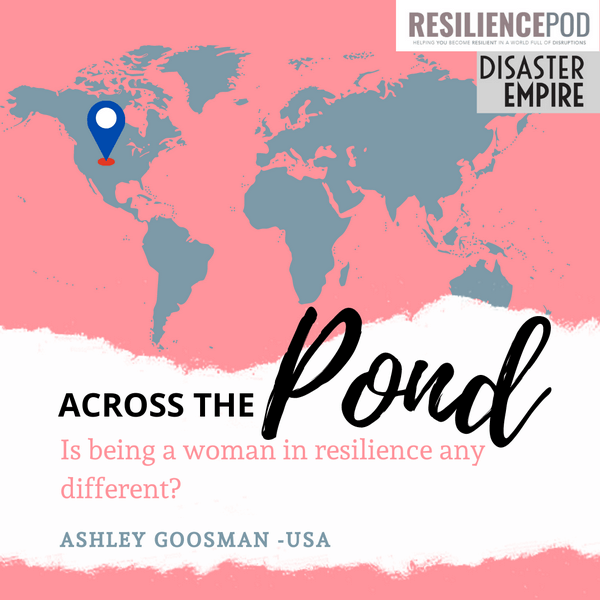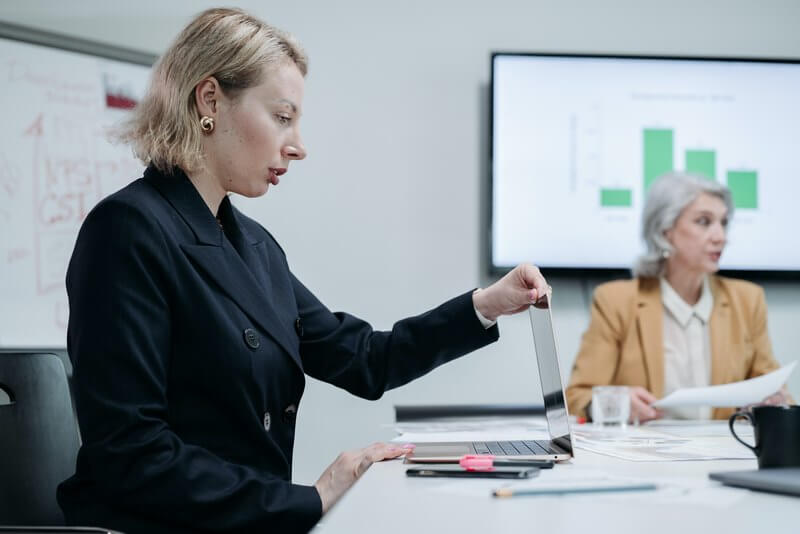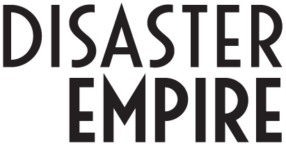
Across the Pond: Is being a woman in resilience any different? Part 2 of 2
- Have you ever wondered if the experience of your fellow women in resilience across the pond differs from yours?
- Does working in the Public and or Private sector mean different experiences?
- Are we just the same woman, having the same challenges and experiences in a different time zone, climate, and culture?
- Want insight and some tips? Read on:
DisasterEmpire’s Ashley Goosman is excited to collaborate with RESILEINCEPOD®’s very own Rina Singh to dig deeper as we explore the UK and USA perspectives of being a woman in the resilience industry.
Let’s get to it: This is Part 2: USA perspective. For part 1, head over RESILIENCEPOD®and let us know what resonates and what doesn’t.

Public v’s Private Sectors: Is it any different?
Ashley: It was not often that women held leadership roles in emergency management, but I enjoyed working with several. Cristine McCombs and Christine Packard led the Massachusetts Emergency Management Agency (MEMA) during that time, and I partnered closely with Elizabeth McDonald of the American Red Cross on multiple disaster recovery efforts. From them, I learned the power of persuasiveness, confidence in presentation, strength in leading teams, and a determination to persevere from them.
When I moved into the private sector and business continuity, I went from a trusted entity to a complete unknown. I lost the standing built up over years of successful administration and crisis response. But I like challenges, and moving into a junior role in a large company was a calculated risk. In the beginning, it was not easy. The organization had a defined culture that was difficult to grasp. At first, I relied heavily on a sense of humor and leaned on my public sector training until I fully developed new hard skills. I relied on soft skills and the professionalism that I gained from observing amazing colleagues in the public sector. These were both women and men–like David Trout, Dave Glazebrook, Mike Kass, Archana Joshi, and John Tommaney, to name just a few.

Challenges faced as a woman
Ashley – Gender: One of the challenges I first experienced was being a woman in our field is it was still primarily made up of men. Many of them came into business continuity from an IT, Emergency Management, or a law enforcement background. My experience in the public sector was working with IT personnel on state audits and alongside emergency management and first responders. I came from the health and human services side with a focus on planning and recovery. Today, many more women are involved, and there are even dedicated forums like the BCI’s Women in Resilience to support, network, and attract more females in the industry.
An outsider – I never felt excluded in any way. Still, I got labeled in my role at the Massachusetts Department of Mental Health (DMH) as only providing emotional resilience support for disaster recovery. At first, people were perplexed when I made the switch to the private sector. Still, I saw it as a natural extension of focusing on continuity of operations planning and just taking it to the business side. I learned fast and believed that business continuity planning is not a luxury but a necessity for all businesses—large or small.

Overcoming challenges
Ashley -I learned quickly that my COOP background and DRI International certification only got me so far. Although I knew that every company executed business continuity differently, I did not plan for the resistance I initially faced to new ideas. Instead, I found that my suggestions were met with little interest and was often left to fend for myself. Sadly, this usually happens to women in our careers. We sometimes have to prove ourselves three times over before others listen to us. My early experiences in the corporate world often beat down my confidence in my abilities.
It took an investment in personal growth outside of the workplace to overcome the blows to my self-esteem. I began my blog, DisasterEmpire.com, in 2019 to give back and share expertise not leveraged in my day-to-day work. My interest in health and wellness also grew at that time. Additionally, I began to network with women I admired in our field, like Tracey Forbes Rice of Fusion Risk Management, and actively sought opportunities to share my knowledge with others. Having come from a human services background initially, it has remained vital for me to be active and find a way to advance others in the field. This experience helped me become authentic in my work and personal presentation by striving to be the best version of myself.

Tips
Ashley -Build your brand: Fortunately, I have a glass-half-full personality. My outlook is always to try to make the best of every situation. However, I recognize that I have had to make moves to grow at critical times in my career. Whether seeking out new roles or changing career direction, as I did from the public to private sector, it is essential always to be willing to challenge yourself to grow.
If we stay stagnant and never try new endeavors, we will not progress in our professional or personal lives. So, I recommend that you not only give your all at work but that you seek to build your brand. If you want to advance in today’s world, it is crucial to network and volunteer for new opportunities. And yes, networking is possible even during COVID! For example, I have met many fabulous women by launching Business Continuity Resilience Insurance Network this year. My co-chair, Dianne Stephens, is someone I did not know before I started the process. Another is that while I was with DMH after I agreed to speak to a class about my work, the professor asked if I would take over teaching his course for the next semester. I leaped and taught a class on disaster and terrorism for the next seven years.
It is essential to know your strengths are and try to leverage them while learning new things. I also advise understanding that there is no single recipe book for business continuity and crisis management. Every company or colleague I engage with does the work of business continuity a little differently. So, be prepared to be flexible to adjust to the needs of where you work but continue to advocate to close known gaps.

Become a learner and networker
Commit to be a life-long learner and invest in building your network. I am amazed by the people I meet in our field that I engage with every day. I would not be where I am today without my network, so I value it highly. My network helped me get new positions and speaking engagements.
Last, as women, one area of deficiency I often see is that we do not always advocate professionally for ourselves. I recommend leadership expert Susan Colantuono’s excellent Ted Talk on The Career advice you probably didn’t get should be required viewing for all women starting their careers. It is even helpful for any woman who feels stuck in middle management and wants to advance. As women, we often excel at giving it all but not always demanding what we’ve earned.
If you want to read more about my experience, check out more of my Disaster Empire blog. Also, make sure you continue to follow all of the great content Rina Sing is producing over at the ResiliencePOD.
